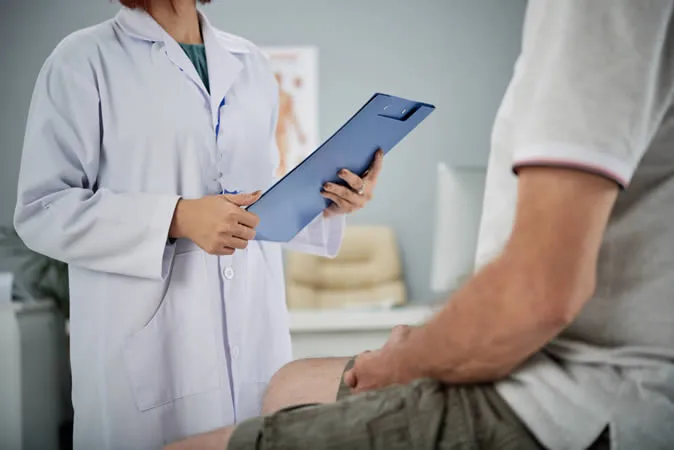Candidiasis
What is Candidiasis?
Candidiasis, commonly known as a yeast infection, is caused by an overgrowth of Candida, a type of yeast normally found on the skin, mucous membranes, and in the digestive tract. When conditions favor its proliferation, Candida can lead to infections in various body parts. These infections include oral thrush (mouth and throat), vaginal yeast infections (genital area), and skin-related issues like redness and itching. Symptoms vary depending on the location of the infection.
Treatment typically involves antifungal medications, either applied topically or taken orally. Candidiasis can affect anyone, especially when the immune system is compromised or the body’s microbial balance is disrupted. Seeking medical advice is important for proper diagnosis and effective management, especially in cases of recurrent or severe infections.

What are the causes of Candidiasis?
Candidiasis is caused by an overgrowth of Candida, a type of yeast that is normally present in small amounts on the skin, mucous membranes, and in the digestive tract. Several factors can contribute to this overgrowth, leading to the development of Candidiasis:
-
Weakened Immune System: A compromised immune system due to conditions such as HIV/AIDS, certain medications (e.g., steroids or immunosuppressants), or other illnesses can create an environment where Candida can thrive.
-
Antibiotics: Antibiotic use can disrupt the balance of microorganisms in the body, including beneficial bacteria that help control Candida growth, potentially allowing Candida to overgrow.
-
Hormonal Changes: Hormonal fluctuations, such as those occurring during pregnancy, menstruation, or menopause, can make the body more susceptible to Candidiasis.
-
Diabetes: Poorly controlled diabetes can lead to elevated levels of sugar in bodily fluids, providing an ideal environment for Candida to multiply.
-
High Sugar Diet: Diets high in sugar and refined carbohydrates can promote the growth of Candida, as yeast feeds on sugar.
-
Weakened Skin Barrier: Skin damage, cuts, or abrasions can create openings for Candida to enter the body and cause infections.
-
Humid Environments: Warm and moist areas of the body, such as skin folds, provide a conducive environment for Candida to thrive.
-
Tight or Non-Breathable Clothing: Wearing tight or non-breathable clothing can create a warm, damp environment that promotes Candida growth.
-
Sexual Activity: Sexual activity can sometimes introduce Candida into the genital area, leading to infections like vaginal yeast infections.
-
Use of Corticosteroids: Long-term use of corticosteroid medications can weaken the immune system and increase the risk of Candidiasis.
-
Medical Procedures: Certain medical procedures, such as catheter insertion or oral devices, can introduce Candida to the body and lead to infection.
Types of Candidiasis
The most common forms of Candidiasis are:
- Thrush
An oral yeast infection, thrush shows redness, cracking or white patches in the mouth - Cutaneous
Patches of red, raw skin that develops in creases, like under the breasts, belly or groin; itching may also occur - Vaginitis
Yeast infection in the vagina that is often accompanied by cottage-cheese like discharge, pain and burning - Esophagitis
Located in the esophagus, this yeast infection may cause painful swallowing and chest pains
Symptoms
Depending on the area affected, signs of Candidiasis vary and may include:
- Burning
- Difficulty swallowing
- Irritation
- Itching
- Soreness
- Redness
- White skin lesions
Some patients experience no symptoms at all.
What treatments are available for Candidiasis?
Treatment options for Candidiasis vary depending on the location and severity of the infection. Here are some common treatment approaches:
- Antifungal Medications: Topical antifungal creams, ointments, or suppositories are often used to treat localized Candidiasis, such as vaginal yeast infections or oral thrush. Over-the-counter or prescription options are available.
- Oral Antifungal Medications: For more widespread or severe infections, oral antifungal medications may be prescribed. These medications work systemically to target the underlying fungal overgrowth.
- Prescription-Strength Creams: In cases of cutaneous candidiasis (skin infections), your doctor may prescribe stronger antifungal creams or ointments to apply to the affected area.
- Antifungal Tablets or Capsules: Certain types of Candidiasis, such as esophagitis or systemic infections, may require oral antifungal tablets or capsules for effective treatment.
- Home Remedies: Some individuals may find relief from mild cases of Candidiasis using natural remedies like yogurt, garlic, or coconut oil. However, these remedies may not be as effective as medical treatments and should be discussed with a healthcare provider.
- Addressing Underlying Conditions: Treating underlying conditions that contribute to Candidiasis, such as diabetes or immune system disorders, can help prevent recurrence.
- Lifestyle and Hygiene: Maintaining good hygiene, wearing breathable clothing, and avoiding irritants can help prevent and manage Candidiasis.
- Dietary Changes: Some people may benefit from reducing sugar and refined carbohydrate intake, as Candida thrives on sugar. A balanced diet can help support overall health and immune function.

FAQ About Candidiasis
Can Candidiasis affect men as well as women?
Yes, Candidiasis can affect both men and women. While vaginal yeast infections are more common in women, men can develop genital yeast infections (balanitis) or other forms of Candidiasis on the skin or mouth.
Candidiasis contagious? Can it be spread through physical contact?
Candidiasis is not usually considered contagious. It is caused by the body’s own yeast overgrowth and is not transmitted through casual physical contact. However, in rare cases, it may be possible to spread Candida through intimate contact.
Can Candidiasis lead to complications if left untreated?
Yes, untreated Candidiasis can potentially lead to complications. In some cases, the infection can spread, causing more discomfort and affecting different areas of the body. Severe or recurring infections may also indicate underlying health issues.
Are there any specific risk factors that make someone more susceptible to recurrent Candidiasis?
Certain factors such as frequent antibiotic use, weakened immune system, uncontrolled diabetes, or hormonal changes can increase the risk of recurrent Candidiasis.
Can stress or emotional factors contribute to the development of Candidiasis?
While stress alone may not directly cause Candidiasis, it can weaken the immune system, making the body more susceptible to infections, including Candida overgrowth.
Is there a link between Candidiasis and other health conditions, such as allergies or autoimmune disorders?
Some studies suggest a potential connection between Candidiasis and allergies/autoimmune conditions, but more research is needed to establish a definitive link.
Can Candidiasis affect children, and what are the common manifestations in pediatric cases?
Yes, Candidiasis can affect children. Common manifestations in children include diaper rash (diaper dermatitis) and oral thrush (white patches in the mouth).
Is it possible for Candidiasis to occur internally, affecting organs other than the mouth, genitals, or skin?
Yes, Candidiasis can affect internal organs in individuals with weakened immune systems, leading to conditions like invasive candidiasis, which may affect the bloodstream, heart, or other organs.
How does Candidiasis in the nailbeds (onychomycosis) differ from other types of fungal nail infections?
Onychomycosis caused by Candida can be similar to other fungal nail infections, but it may require different treatment approaches. Candida-related onychomycosis can often cause a white or yellow discoloration of the nails.
Is there a dermatologist near me in Providence that offers treatment for Candidiasis?
Yes. At our Providence dermatology office we offer treatment for Candidiasis to patients from Providence and the surrounding area. Contact our office today to schedule an appointment.


